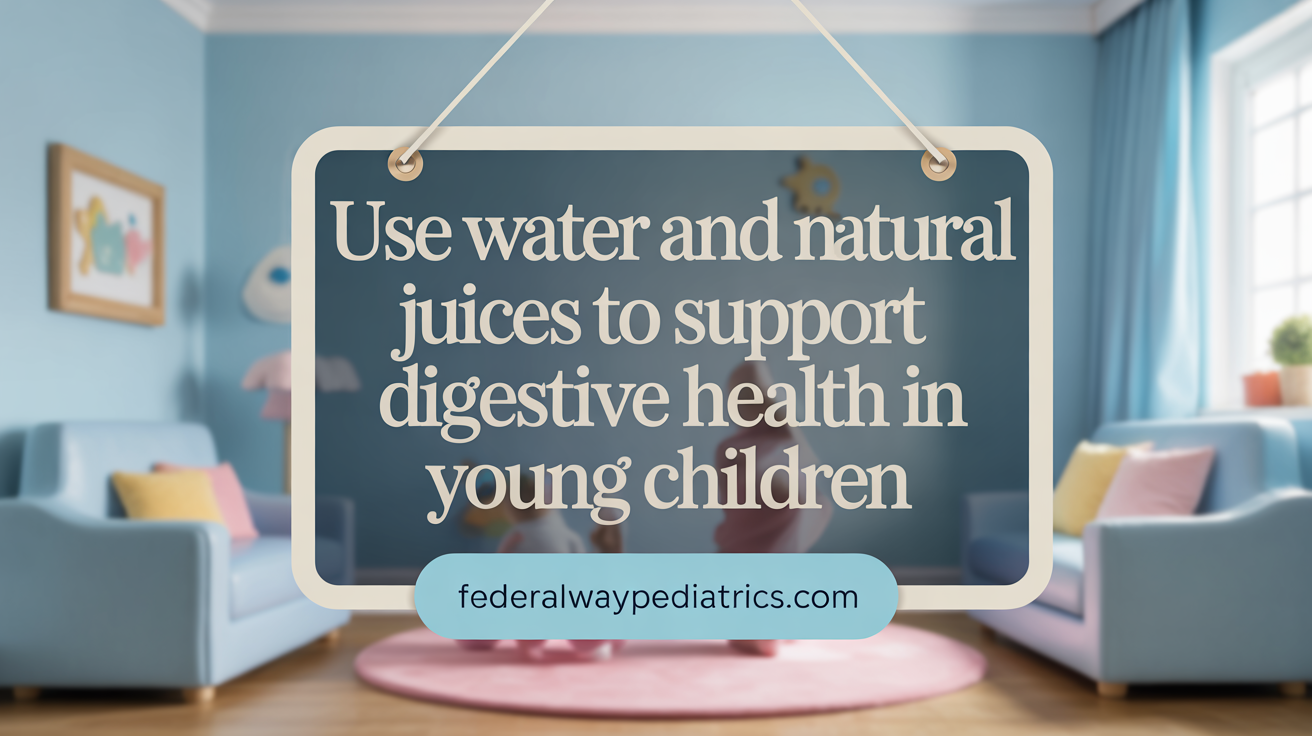Understanding Hydration and Its Importance in Children's Digestive Wellness
Constipation is a common concern among children and adolescents, often causing discomfort and impacting quality of life. While many factors contribute to constipation, hydration plays a crucial preventive role. This article explores how proper fluid intake, alongside balanced electrolytes and supportive lifestyle habits, can help maintain regular bowel movements and gastrointestinal health in young ones. We examine scientific evidence, practical guidance for parents, and the role hydration serves in supporting smooth digestion.
How Hydration Supports Preventing Constipation in Children

How does hydration help prevent constipation?
Proper hydration plays a vital role in preventing constipation in children by ensuring that the stool remains soft and easy to pass. When children drink enough fluids—about 4 cups daily for toddlers and more for older children and teenagers—the water content in the intestines increases, which helps to soften stool. This prevents the formation of hard, dry stools that are difficult to evacuate.
Dehydration can lead to the colon absorbing more water from waste, resulting in dry, compacted stools that cause discomfort and straining during bowel movements. Ensuring adequate fluid intake supports smooth transit through the digestive system, reducing the risk of constipation.
Interaction between hydration and dietary fiber for regularity
Hydration works hand-in-hand with dietary fiber to promote bowel health. Fiber adds bulk to stool and attracts water into the intestines, which helps in softening the stool. For instance, fruits like apples, pears, and prunes provide both fiber and moisture, enhancing regularity.
If children consume a high-fiber diet without sufficient fluids, they may experience gassiness or bloating. Therefore, increasing water intake alongside fiber-rich foods helps maintain optimal stool consistency and supports a healthy digestive process.
Effects of dehydration on stool consistency and comfort
Dehydration causes stools to become hard, dry, and difficult to pass, leading to discomfort, pain, and straining during defecation. Signs of dehydration include dry mouth, decreased urination, and fatigue. Mild dehydration is common in children, especially during hot weather, illness, or vigorous activity.
Maintaining adequate hydration helps keep the stool moist, making bowel movements more comfortable and less painful. This is especially important in children who may not recognize thirst early or may resist drinking fluids.
Recommended daily water intake for children of various ages
Daily water needs vary by age. Young children (1-3 years) should be offered about 4 cups (900 mL) of fluids daily, including breastmilk, milk, water, and limited juice. School-aged children require around 5 cups, and teenagers need approximately 7-8 cups daily, depending on activity level and climate.
Incorporating a variety of fluids like water, milk, vegetable juices, and infused water can help meet these needs. Monitoring urine color—pale or clear urine—is a simple way to assess hydration status.
Avoidance of dehydrating beverages like caffeine and alcohol
Beverages containing caffeine, such as coffee, tea, and colas, can have diuretic effects, promoting fluid loss and worsening dehydration. Alcohol is also dehydrating and should be avoided or limited, especially in children.
Encouraging children to choose water or other hydrating drinks helps maintain fluid balance and prevents constipation. Infusing water with fruits or herbs makes hydration more appealing and encourages regular intake.
Complementary practices like physical activity and toilet posture
Regular physical activity stimulates bowel movements by increasing overall gut motility. Children are recommended to engage in at least one hour of exercise daily.
Proper toilet posture, such as sitting with feet elevated on a stool to simulate a squatting position, can make bowel movements easier and help prevent stool withholding.
Together with adequate hydration and fiber intake, these practices form a comprehensive approach to maintaining healthy bowel function and preventing constipation in children.
The Impact of Electrolyte Balance on Children's Bowel Health

How does electrolyte balance influence constipation prevention in children?
Electrolytes such as sodium, potassium, magnesium, calcium, and chloride are vital in regulating fluid balance and muscle activity in the body, including the intestines. Proper electrolyte levels support the muscles that propel stool through the digestive tract. When electrolyte balance is disrupted—due to dehydration, poor diet, or illness—muscle contractions in the gut can become sluggish, increasing the risk of constipation.
Magnesium, for instance, helps relax the muscles in the digestive tract, facilitating smoother bowel movements. Adequate magnesium intake, whether through diet or supplements, can soften stool and improve transit time. Conversely, imbalances—such as low potassium levels—can cause sluggish bowel movements, further contributing to constipation.
Electrolyte solutions, like polyethylene glycol combined with electrolytes (PEG+E), have demonstrated benefits in managing chronic constipation in children by restoring fluid and electrolyte balance, thus promoting easier bowel movements.
It is also important to note that dehydration typically results in electrolyte disturbances, which dry out stool and impair intestinal motility. Ensuring children consume sufficient fluids and balanced electrolytes helps maintain normal gut function.
In some cases, medications—including certain supplements and foods that restore electrolyte levels—are used to support intestinal motility. However, excessive intake of calcium or iron supplements, or medications that alter electrolyte balance, may worsen constipation.
Overall, maintaining a balanced electrolyte profile through diet, hydration, and targeted supplementation is essential to prevent constipation and promote healthy bowel function in children.
Scientific Evidence Linking Fluid Intake and Constipation Prevention in Youth
What do epidemiological studies say about water and fluid intake related to constipation risk?
Research suggests there is a connection between how much children and adolescents drink and their risk of developing constipation. A review of 11 studies found that lower fluid intake may increase the likelihood of experiencing constipation. Specifically, four out of six observational studies reported a significant association between reduced water consumption and constipation symptoms. These studies show that children drinking less than about 800 mL daily—roughly four glasses—have higher odds of constipation.
How do findings from observational studies compare to clinical trials on hydration?
Most evidence comes from observational research, which hints that increasing fluid intake might help prevent constipation. However, a notable clinical trial from 1998 did not show a clear benefit of simply increasing water intake as a treatment for existing constipation. This discrepancy underscores that while hydration appears helpful in prevention, its role in treating severe or ongoing constipation remains less certain, and current guidelines do not recommend water intake alone as an effective therapy.
What are the limitations of current research, and why is further study needed?
The existing evidence is limited by the small number of studies and their methodological differences. Many are observational, which cannot definitively prove that low fluid causes constipation—only that they are associated. There is a pressing need for more rigorous clinical trials to clarify whether increasing fluid intake can prevent or treat constipation effectively, considering the varying dietary habits and hydration recommendations across different populations.
What statistics link low fluid intake to higher rates of constipation?
Statistical analyses reveal a dose-response pattern: children who consume less than four glasses (around 800 mL) of water daily are significantly more likely to experience constipation. For example, those in the lowest intake quartile had an odds ratio of approximately 1.9 to 2.0, meaning nearly double the risk compared with children who drank more. The relationship is non-linear, with higher fluid intake correlating with progressively lower risks, emphasizing the importance of adequate hydration.
What do pediatric guidelines recommend regarding fluid intake?
Guidelines from NASPGHAN and ESPGHAN advise that children should drink daily amounts appropriate for their age—about 4 cups for toddlers, 5 cups for school-age children, and 7-8 cups during adolescence—fostering normal bowel function. These guidelines highlight hydration as part of a comprehensive strategy to prevent constipation, alongside diet and activity modifications.
What are the hydration thresholds linked to reduced constipation risk?
Evidence suggests that maintaining a daily fluid intake above approximately 800 mL significantly lowers the risk of constipation. Drinking less than this amount has been associated with increased odds of stool hardening and difficulty passing. Encouraging children to meet these hydration targets can be a simple, effective measure to help maintain regular bowel movements and prevent constipation.
Hydration Strategies and Tips for Parents to Prevent Constipation in Children
What educational guidance can parents and caregivers follow to manage and prevent constipation through hydration?
To help prevent and manage constipation, parents and caregivers should focus on ensuring children drink enough fluids daily. The general recommendation is for children to consume six to eight glasses of water each day. This intake supports softening of stools and promotes regular bowel movements.
In addition to adequate hydration, a diet high in fiber is vital. Including whole grains, fruits, vegetables, and legumes can considerably improve bowel health. High-fiber foods add bulk to stool and work synergistically with fluids to ease passage.
Establishing consistent toilet routines is crucial. Encouraging children to sit on the toilet for 5 to 10 minutes at the same times each day, such as after meals, helps develop healthy habits and reduces stool withholding.
Physical activity also plays an essential role. Regular exercise stimulates bowel movements and overall gut motility. Simple activities like walking or playing outside can make a difference.
Proper toilet posture, such as using a small stool to elevate feet while sitting on the toilet, can facilitate easier bowel movements.
Parents should also be vigilant about signs of dehydration in children, including dry mouth, decreased urination, fatigue, and irritability. Maintaining good hydration during hot weather, illness, or physical activity is especially important.
For additional motivation, making water more appealing by infusing it with fruits or using fun water bottles can increase intake.
Consulting healthcare providers is recommended if constipation persists despite these measures. They can prescribe laxatives or suggest further interventions if needed.
By combining adequate fluid intake, a fiber-rich diet, routine toilet habits, and physical activity, parents can effectively prevent childhood constipation and promote gastrointestinal health.
Hydration’s Role in Managing Constipation Among Infants and Toddlers

Use of water and appropriate juices in infant constipation relief
Ensuring adequate fluid intake is essential for relieving constipation in infants and toddlers. Water helps soften stools, making bowel movements easier and reducing discomfort. For babies over one month old, giving small amounts of water—usually less than 4 ounces at a time—is generally safe and can be beneficial. Juices such as apple, pear, or prune juice contain sorbitol, a natural laxative that can stimulate bowel movements and ease stool passage.
Fluid intake recommendations for infants and toddlers
The amount of fluids necessary varies by age. Infants under 6 months usually rely solely on breast milk or formula, which provide sufficient hydration. Children aged 1-3 years should be offered about 4 cups (900 mL) daily, including breast milk, milk, water, and limited juice. As children grow, their hydration needs increase, with recommended daily intakes reaching approximately 7-8 cups for teenagers. Regular hydration supports digestion and prevents the dryness that can cause or worsen constipation.
Safe small water portions for babies older than one month
For babies older than one month, offering small, frequent sips of water—such as 1 to 2 ounces—can help in managing constipation without disrupting their nutrient intake from breast milk or formula. Care should be taken not to replace these primary sources of nutrition. Infants should not be given large quantities of water to avoid interfering with electrolyte balance or causing water intoxication.
Benefits of juices containing sorbitol (apple, pear, prune)
Juices like prune, apple, and pear contain sorbitol, a sugar alcohol that can draw water into the intestines and promote bowel movements. These natural remedies are often recommended as a first-line dietary intervention for infants and young children with constipation. It is advisable to serve these juices diluted and in moderation to avoid excessive sugar consumption.
Combining hydration with dietary fiber and gentle physical measures
Effective constipation management often involves combining adequate hydration with high-fiber foods such as pureed fruits, vegetables, and whole grains. Gentle abdominal massages and encouraging physical activity can further stimulate bowel movements. Establishing regular toileting routines also helps prevent stool withholding behaviors.
Monitoring for persistent symptoms and consulting healthcare professionals
While increased fluid intake and diet modifications can help, persistent constipation should be evaluated by a healthcare provider. Signs that warrant professional consultation include excessive discomfort, blood in stool, vomiting, or if constipation lasts longer than a few days. Proper medical guidance ensures safe and effective treatment tailored to the child's needs.
Maintaining Gastrointestinal Health in Children Through Hydration and Lifestyle
How dehydration affects digestion and nutrient absorption
Dehydration significantly impacts children's digestive health by making stools hard and dry, which complicates bowel movements. When the body lacks sufficient fluids, the large intestine absorbs more water from waste, reducing stool moisture and leading to constipation. Furthermore, dehydration can impair nutrient absorption, as water is essential for breaking down food in the stomach and facilitating the transfer of nutrients into the bloodstream through the small intestine. Without proper hydration, digestion slows down, increasing the risk of discomfort and gastrointestinal issues.
Children’s vulnerability to dehydration due to higher water needs and lower thirst awareness
Children are more susceptible to dehydration than adults because their bodies contain a higher proportion of water relative to their size, and they have increased metabolic rates. Additionally, children often lack awareness of their thirst signals, especially during physical activity or in hot environments, which can result in insufficient fluid intake. This vulnerability makes it especially important to encourage children to drink regularly and recognize early signs of dehydration.
Signs and risks of dehydration in children
Early signs of dehydration in children include dry mouth, lips, and skin, decreased urination, fatigue, irritability, sunken eyes or fontanel in infants, and fewer or darker urine outputs. Severe dehydration can lead to dizziness, rapid heartbeat, and even cardiovascular complications. If left unaddressed, dehydration can cause electrolyte imbalances, impair bodily functions, and worsen constipation. Recognizing these signs early and ensuring adequate hydration are crucial steps in maintaining overall health.
Importance of combining hydration, fiber, and physical activity
Ensuring sufficient fluid intake alone isn't enough; combining hydration with a high-fiber diet and regular physical activity creates an effective strategy against constipation. Fiber-rich foods — such as fruits, vegetables, and whole grains — add bulk and water retention capacity to stool, easing its passage through the intestines. Physical activity stimulates bowel motility, further enhancing healthy bowel movements. Together, these lifestyle factors support smooth digestion, prevent stool withholding behaviors, and promote gastrointestinal wellness.
Role of routine and posture in bowel regularity
Establishing consistent toilet routines, such as sitting on the toilet after meals, helps promote bowel movements and prevents stool withholding. Proper posture, such as sitting in a squatting position with feet raised on a stool, can make bowel evacuation easier. These habits reinforce natural bowel cues, reduce discomfort, and contribute to maintaining regularity, especially in children still learning toileting routines.
Avoiding contributing factors like sedentary behavior and low-fiber diets
Sedentary lifestyles, frequent consumption of fast foods, and diets low in fiber are common contributors to childhood constipation. Reducing screen time, encouraging outdoor play, and offering high-fiber foods are essential preventative measures. Minimizing the use of medications that can impair gut motility, such as certain antibiotics or anticholinergic drugs, under healthcare supervision can also help maintain healthy bowel function. Promoting an active lifestyle and balanced diet forms the backbone of effective constipation prevention in children.
The Essential Role of Hydration in Children's Digestive Health
Proper hydration is a foundational element in the prevention and management of constipation in young individuals. Through softening stools, supporting electrolyte balance, and aiding digestive function, adequate fluid intake works synergistically with diet, physical activity, and healthy toilet habits to maintain gastrointestinal wellness. While scientific studies advocate hydration primarily as a preventive measure, its incorporation into daily routines is vital for children's comfort and health. Educating caregivers and empowering children to embrace hydration can lead to fewer bowel issues and improved quality of life, making water a key pillar in nurturing young digestive health.
References
- Water and fluid intake in the prevention and treatment of functional ...
- How do Electrolyte Levels Affect Kids' Constipation? - Begin Health
- Mild dehydration: a risk factor of constipation? - PubMed
- Water and fluid intake in the prevention and treatment of functional ...
- Why is Hydration Important in Children
- Healthy Hydration: Water's Role in Kids' Gastrointestinal Health
- How Does Dehydration Affect Kids' Constipation? - Begin Health
- Easing Your Child's Constipation - Academy of Nutrition and Dietetics
- Water, Constipation, Dehydration, and Other Fluids - WebMD
- Food as Medicine: Food Therapy for Constipation
